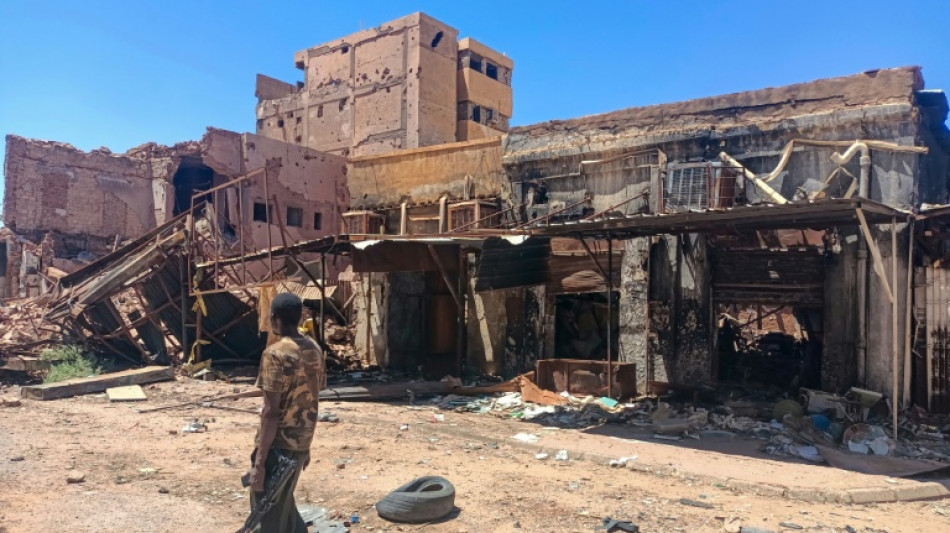
-
 Rahm out to break 2025 win drought ahead of US PGA Championship
Rahm out to break 2025 win drought ahead of US PGA Championship
-
Japan tariff envoy departs for round two of US talks
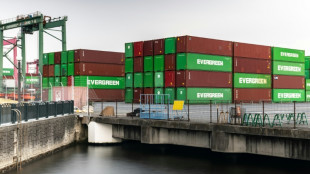
-
 Djurgarden eyeing Chelsea upset in historic Conference League semi-final
Djurgarden eyeing Chelsea upset in historic Conference League semi-final
-
Haliburton leads comeback as Pacers advance, Pistons stay alive

-
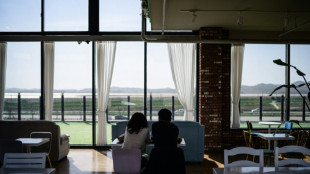 Bunker-cafe on Korean border paints image of peace
Bunker-cafe on Korean border paints image of peace
-
Tunics & turbans: Afghan students don Taliban-imposed uniforms
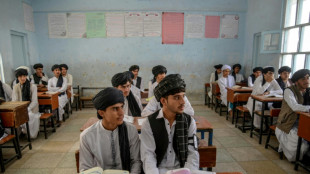
-
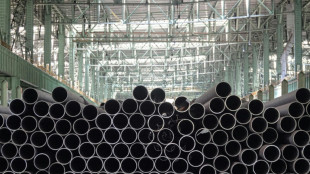 Asian markets struggle as trade war hits China factory activity
Asian markets struggle as trade war hits China factory activity
-
Norwegian success story: Bodo/Glimt's historic run to a European semi-final

-
 Spurs attempt to grasp Europa League lifeline to save dismal season
Spurs attempt to grasp Europa League lifeline to save dismal season
-
Thawing permafrost dots Siberia with rash of mounds
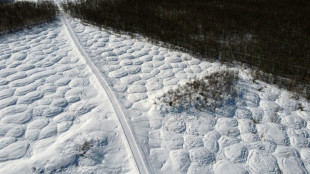
-
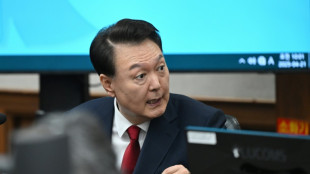 S. Korea prosecutors raid ex-president's house over shaman probe: Yonhap
S. Korea prosecutors raid ex-president's house over shaman probe: Yonhap
-
Filipino cardinal, the 'Asian Francis', is papal contender
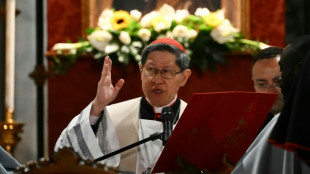
-
 Samsung Electronics posts 22% jump in Q1 net profit
Samsung Electronics posts 22% jump in Q1 net profit
-
Pietro Parolin, career diplomat leading race to be pope
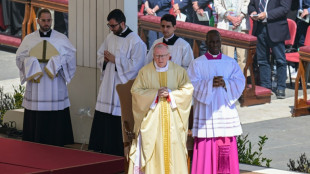
-
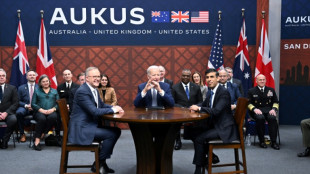 Nuclear submarine deal lurks below surface of Australian election
Nuclear submarine deal lurks below surface of Australian election
-
China's manufacturing shrinks in April as trade war bites
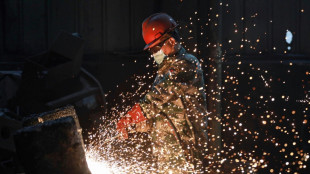
-
 Financial markets may be the last guardrail on Trump
Financial markets may be the last guardrail on Trump
-
Swedish journalist's trial opens in Turkey
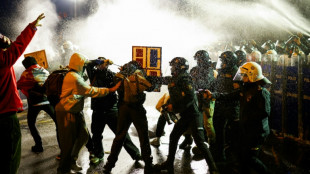
-
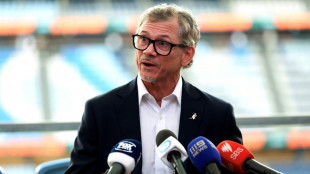 Kiss says 'honour of a lifetime' to coach Wallabies at home World Cup
Kiss says 'honour of a lifetime' to coach Wallabies at home World Cup
-
US growth figure expected to make for tough reading for Trump
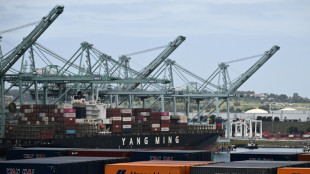
-
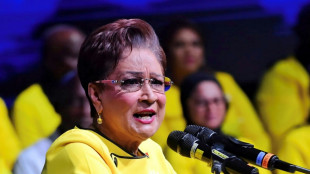 Opposition leader confirmed winner of Trinidad elections
Opposition leader confirmed winner of Trinidad elections
-
Snedeker, Ogilvy to skipper Presidents Cup teams: PGA Tour

-
 Win or bust in Europa League for Amorim's Man Utd
Win or bust in Europa League for Amorim's Man Utd
-
Trump celebrates 100 days in office with campaign-style rally

-
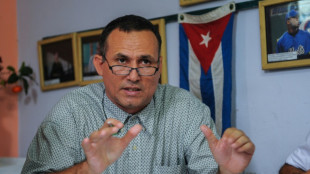 Top Cuban dissidents detained after court revokes parole
Top Cuban dissidents detained after court revokes parole
-
Arteta urges Arsenal to deliver 'special' fightback against PSG

-
 Trump fires Kamala Harris's husband from Holocaust board
Trump fires Kamala Harris's husband from Holocaust board
-
Pakistan says India planning strike as tensions soar over Kashmir attack
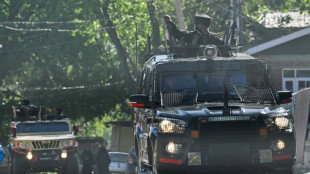
-
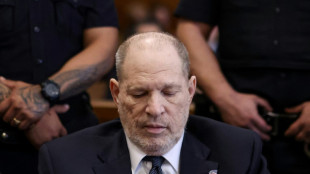 Weinstein sex attack accuser tells court he 'humiliated' her
Weinstein sex attack accuser tells court he 'humiliated' her
-
France accuses Russian military intelligence over cyberattacks
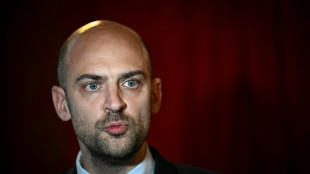
-
 Global stocks mostly rise as Trump grants auto tariff relief
Global stocks mostly rise as Trump grants auto tariff relief
-
Grand Vietnam parade 50 years after the fall of Saigon
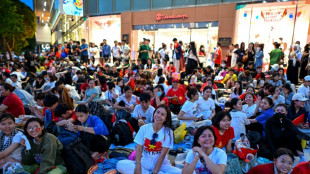
-
 Trump fires ex first gentleman Emhoff from Holocaust board
Trump fires ex first gentleman Emhoff from Holocaust board
-
PSG 'not getting carried away' despite holding edge against Arsenal

-
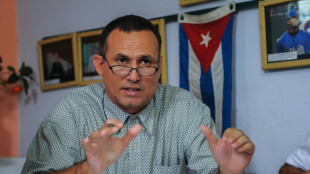 Cuban dissidents detained after court revokes parole
Cuban dissidents detained after court revokes parole
-
Sweden stunned by new deadly gun attack
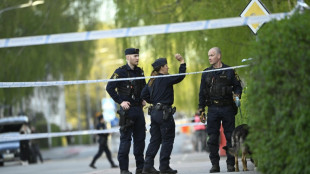
-
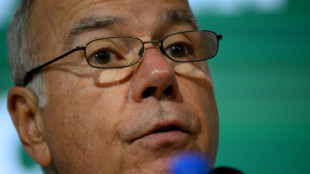 BRICS blast 'resurgence of protectionism' in Trump era
BRICS blast 'resurgence of protectionism' in Trump era
-
Trump tempers auto tariffs, winning cautious praise from industry

-
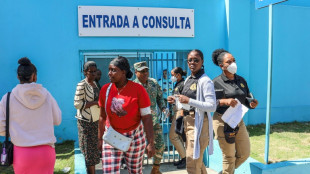 'Cruel measure': Dominican crackdown on Haitian hospitals
'Cruel measure': Dominican crackdown on Haitian hospitals
-
'It's only half-time': Defiant Raya says Arsenal can overturn PSG deficit

-
 Dembele sinks Arsenal as PSG seize edge in Champions League semi-final
Dembele sinks Arsenal as PSG seize edge in Champions League semi-final
-
Les Kiss to take over Wallabies coach role from mid-2026

-
 Real Madrid's Rudiger, Mendy and Alaba out injured until end of season
Real Madrid's Rudiger, Mendy and Alaba out injured until end of season
-
US threatens to quit Russia-Ukraine effort unless 'concrete proposals'
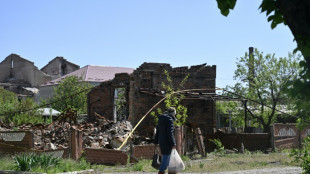
-
 Meta releases standalone AI app, competing with ChatGPT
Meta releases standalone AI app, competing with ChatGPT
-
Zverev crashes as Swiatek scrapes into Madrid Open quarter-finals

-
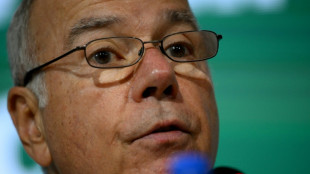 BRICS members blast rise of 'trade protectionism'
BRICS members blast rise of 'trade protectionism'
-
Trump praises Bezos as Amazon denies plan to display tariff cost
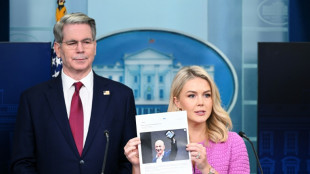
-
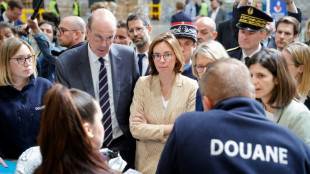 France to tax small parcels from China amid tariff fallout fears
France to tax small parcels from China amid tariff fallout fears
-
Hong Kong releases former opposition lawmakers jailed for subversion


'No one else will': Sudan's journalists risk all to report the war
On a mountain near Sudan's border, journalists climb rugged slopes, phones held high, hoping to catch a faint signal from neighbouring Chad to send stories amid the war's two-year communications blackout.
Journalists say efforts like these are their only way to tell the world about the horrors unfolding in Darfur, where accounts of sexual violence, ethnic massacres and mass displacement continue to emerge.
Since fighting erupted between the army and the paramilitary Rapid Support Forces (RSF) in April 2023, at least 28 reporters have been killed, according to Sudan's journalist union.
Dozens more have been detained and tortured, while many have been displaced and cut off from electricity, water and internet.
Noon, a 35-year-old freelance journalist who requested a pseudonym for her safety, said she was forced to flee the West Darfur capital of El-Geneina after reporting on ethnically motivated mass killings committed by the RSF and its allied militias in 2023.
Her stories on the massacres, where UN experts say up to 15,000 mostly Massalit people were killed -- leading to genocide accusations against the RSF -- made her a target.
"They raided my family's house. They took all my equipment, my cameras, everything," she said.
By the third raid, she knew she had to go, and fled with her family to the eastern state of Gedaref, nearly 1,800 kilometres (1120 miles) away.
But even there, she was not safe.
- In the shadows -
While reporting in a displacement shelter, she said she was arrested by the army, accused of collaborating with the RSF and forced to sign a pledge to obtain government approval on every story.
According to Reporters Without Borders, since the start of the war more than 400 journalists have fled the country, which last year was second only to Gaza in the Committee to Protect Journalists' tally of reporters killed.
Yet some remain on the ground, working in secret with nothing to their name.
In the North Darfur town of Tawila, where the UN says 180,000 survivors of nearby RSF attacks are sheltering, 30-year-old photojournalist Ibrahim works undercover to report on those trapped between famine and brutal violence.
"No one can know what I do," Ibrahim, who asked to use a pseudonym to protect his identity, told AFP.
"If they find out, they'll arrest me or take my phone," he said.
Last July, RSF fighters detained him in El-Fasher and accused him of being an army spy. He said they tortured him for five days and confiscated his equipment, documents and money.
Since then, he has sent his family out of Darfur and relocated to Tawila, leaving his cameras behind. His mobile phone is all he has left.
- 'Biggest crime' -
Even before the war, Sudan was a hostile environment for journalists, consistently ranking near the bottom of the Reporters Without Borders's Press Freedom Index.
Since the fighting began, conditions have only worsened. Many journalists have been forced to flee, while others remain trapped across the country, struggling to survive.
In the central state of Al-Jazira, the country's breadbasket prior to the war, veteran reporter Youssef, 62, now raises goats and grows sorghum to support himself.
"The last salary I received was at the beginning of 2024," he told AFP by phone from state capital Wad Madani.
"My newspaper moved operations to Cairo, but I still send them reports -- when I can get a signal."
Youssef, whose name has also been changed, lost all contact with his editors and the outside world for months while the RSF controlled the city.
In February 2024, fighters stormed his home.
"They tied my hands, blindfolded me, shackled my feet," he recalled. "No food. No toilets. I was detained for three days."
He said when he told those interrogating him he was a journalist, a fighter said: "That is the biggest crime."
He was freed only after a local community leader signed a guarantee pledging that Youssef would remain under house arrest. He did not leave until the army recaptured Wad Madani in January.
Both Youssef and Ibrahim say they have received no protection from local or international media organisations.
Still, Ibrahim continues, turning a coffee shop in Tawila -- powered by a single public solar panel -- into a makeshift newsroom.
"Who else will tell the world what's happening in Darfur if we leave?" he told AFP, crouching to reach his phone, plugged into an overloaded extension cord.
"No one else will tell these stories. No one can imagine the atrocities happening here."
L.Meier--VB
